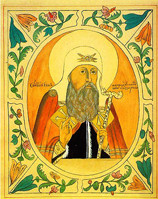
Anniversary of the establishment of patriarchate in Moscow. Metropolitan Job elected Patriarch
January 23 (February 2), 1589 metropolitan Job was elected patriarch of Moscow and All Russia.
Prior to the establishment of the patriarchate, the Russian church was headed by Metropolitan. Until the middle of the 15th century it belonged to the Patriarchate of Constantinople, and had no independent governance. After the fall of Byzantium, Metropolitan of Moscow gained its independence from the Church of the Constantinople Patriarchate. In 1448 the Council of Russian bishops, regardless of Constantinople, elected for cathedra the Metropolitan of Moscow and All Russia, Bishop of Ryazan Jonah, marking the beginning of autocephalous status of the Russian Orthodox Church. In 1586, Patriarch Joachim of Antioch visited Moscow, and in 1588 it was Constantinople Patriarch Jeremiah II. Both of them agreed with the idea of establishment of the Moscow patriarch's throne.
January 23 (February 2), 1589 at the Assumption Cathedral of the Kremlin, in Pohvalsky chapel - a traditional place of election of candidates for metropolitan, in the presence of the Patriarch of Constantinople and the Holy Council members, the election of candidates for the patriarchate took place.
Then, all the participants of the elections came to the palace where Jeremias II presented to Tsar Fyodor Ivanovich three candidates: the Metropolitan of Moscow and All Russia, Job, Archbishop of Novgorod Alexander and the Archbishop of Rostov Barlaam. Here, in the tsar's chambers, Job was named patriarch.
January 26 (February 5), 1589 Patriarch Jeremias II of Constantinople with the assembly of bishops made the enthronement of the first Russian patriarch Job.
Before leaving Moscow, Patriarch Jeremias left the “Legislative letter", signed by him and his accompanying clergymen, which attested to the institution of the patriarchate in Russia.
At the Councils of Constantinople of 1590 and 1593, attended by Eastern patriarchs, it was decided to recognize and confirm all that had been done by Patriarch Jeremias in Moscow in connection with the institution of the Russian patriarchate, to attribute the patriarchal rights in Russia personally to the patriarch Job, and to all his successors at all times and to recognize the Russian patriarch to be the fifth after the patriarchs of Constantinople, Alexandria, Antioch and Jerusalem.
In 1721 during the reign of Peter I the patriarchate was abolished, the Emperor established a Theological Board, later renamed into the Holy Synod - the state body of the highest authority of the Church.
October 28 (November 11), 1917 upon the decision of the All-Russian Local Council the patriarchate was restored.
Lit.: Иеродиакон Николай (Летуновский). К 90-летию восстановления Патриаршества [Электронный ресурс] // Московская Епархия Русской Православной Церкви. 2001-2019. URL: http://www.mepar.ru/library/vedomosti/27/385/; Макарий (Веретенников). Патриаршество на Руси // Церковный Вестник. № 11 (312). Июнь 2005; Московское Патриаршество 1589-1700 // Русская Православная Церковь, 988-1988. Очерки истории I-XIX вв. М., 1988. Вып. 1; Петрушко В. Установление патриаршества в Русской церкви. Святой патриарх Иов [Электронный ресурс] // Православие.Ru. 1999-2008. URL: http://www.pravoslavie.ru/arhiv/040310103305.htm.
Based on the Presidential Library’s materials:
Metropolitan Tikhon elected the patriarch of Moscow and All Russia // On this day. 18 November 1917;
Metropolitan Filaret mounts the patriarch throne // On this day. 4 July 1619;

